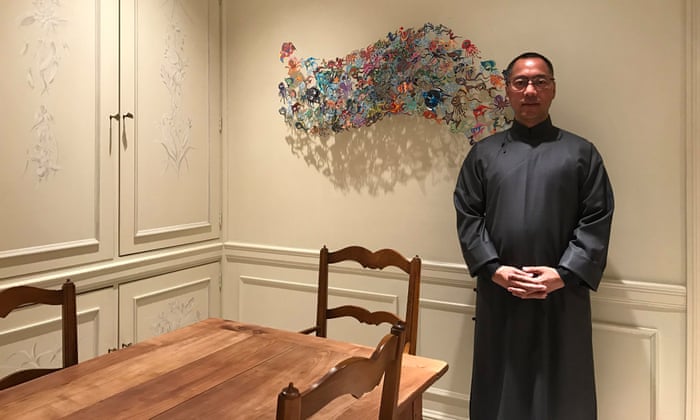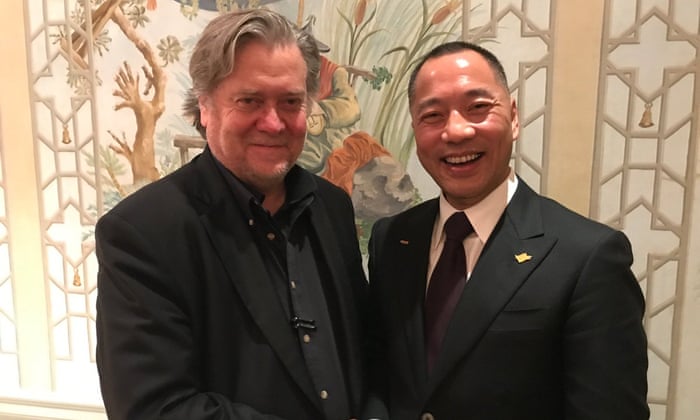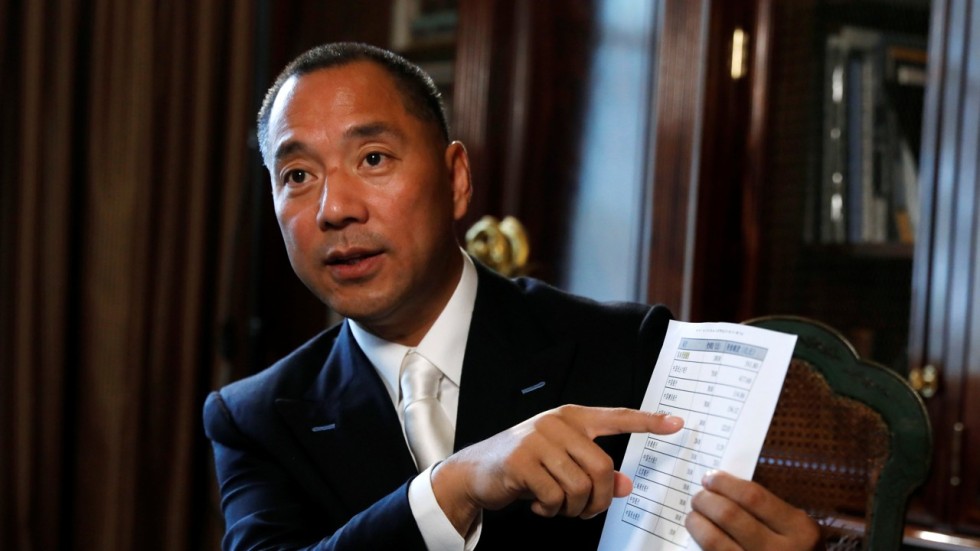
Hong Kong’s most visible pro-democracy activist Joshua Wong joins Taiwan’s New Power Party chairman Huang Kuo-chang, Taiwan’s “Sunflower Movement” leaders Li Fei-fan and Chen Wei-ting chant slogans to demand the Chinese government release detained Taiwanese rights activist Lee Ming-cheh in Taipei.
Hong Kong’s pro-democracy demonstrations appear to be having a major impact on Taiwan’s presidential campaign in advance of its January 2020 election.
Protest leaders urge the Taiwanese to express emphatic vocal support for Hong Kong’s democratic aspirations.
To a large extent, that is already happening.
Taiwan’s president, Tsai Ing-wen, frequently speaks out in favor of the Hong Kong demonstrators and their demands, infuriating Beijing.
Protests in Hong Kong have made the Taiwanese “increasingly treasure” their democracy and “deeply feel” what it would be like if China treated them the way it’s handling Hong Kong, Tsai said in June.
The emergence of a de facto Hong Kong-Taiwan democratic political axis has heightened Beijing’s nervousness and paranoia.
The emergence of a de facto Hong Kong-Taiwan democratic political axis has heightened Beijing’s nervousness and paranoia.
Not only do Communist Party leaders have to deal with the rising popular defiance in Hong Kong to Beijing’s authority, but the prospect of any negotiations for Taiwan’s reunification with the mainland now looks utterly remote.
Xi Jinping’s government is not likely to tolerate high-profile policy defeats on two fronts, yet that outcome is a growing possibility.
The situation has become a ticking time bomb.
Joshua Wong, a prominent figure in Hong Kong’s street protests, is stepping up his efforts to enlist the Taiwanese.
Joshua Wong, a prominent figure in Hong Kong’s street protests, is stepping up his efforts to enlist the Taiwanese.
“We hope that before Communist China’s National Day on Oct. 1, our friends in Taiwan can express their support for Hong Kong through street protests,” Wong said at a news conference on September 3.
“A lot of people in the past have said ‘today Hong Kong and tomorrow Taiwan.’ But I think the most ideal thing we’d say is ‘Taiwan today, tomorrow Hong Kong.’ Hong Kong can be like Taiwan, a place for freedom and democracy.”
Such sentiments by themselves are enough to enrage Beijing.
Such sentiments by themselves are enough to enrage Beijing.
But Wong also urged Taiwan’s government to let Hong Kong protesters seek political asylum.
Worse from Beijing’s standpoint, he made those statements not in Hong Kong or some neutral location, but in Taipei following meetings with Taiwan’s governing, pro-independence Democratic Progressive Party (DPP).
Communist Chinese leaders are likely to interpret such a venue as further evidence of a Hong Kong-Taiwanese political alliance against the People’s Republic of China (PRC).
Beijing’s persistent attempts to undermine Hong Kong’s political autonomy under its “one county, two systems” arrangement has caused Taiwanese attitudes to turn emphatically against such a formula for their island.
Beijing’s persistent attempts to undermine Hong Kong’s political autonomy under its “one county, two systems” arrangement has caused Taiwanese attitudes to turn emphatically against such a formula for their island.
Most Taiwanese were never enthusiastic about that proposal, but the proposed Hong Kong extradition law (just now withdrawn) that would have enabled Chinese authorities to try Hong Kong-based political dissidents in mainland courts has soured Taiwanese public opinion even more.
A poll that Taiwan’s Mainland Affairs Council published in late July found that 88.7 percent of respondents rejected one country, two systems, up from 75.4 per cent in a January survey.
The Hong Kong democracy campaign is strengthening hardline, anti-PRC factions in Taiwan. Incumbent President Tsai appeared to be in deep political trouble earlier this year.
The Hong Kong democracy campaign is strengthening hardline, anti-PRC factions in Taiwan. Incumbent President Tsai appeared to be in deep political trouble earlier this year.
Taiwan’s continuing economic malaise had undermined her presidency, and the DPP suffered huge losses in November 2018 local elections.
Indeed, the losses were so severe that Tsai had to quit her post as party chair.
She also faced a strong primary challenge for the DPP’s presidential nomination from her onetime prime minister, James Lai.
But Tsai has shrewdly exploited public anger at Beijing’s crude attempts to undermine Hong Kong’s autonomy to rebuild her domestic political support.
But Tsai has shrewdly exploited public anger at Beijing’s crude attempts to undermine Hong Kong’s autonomy to rebuild her domestic political support.
“As long as I am here, I will stand firm to defend Taiwan’s sovereignty,” Tsai pledged in July. “As long as I am here, you would not have to fear, because we will not become another Hong Kong.”
That message resonated with voters, and not only did she defeat Lai, but her fortunes against the opposition Kuomintang Party in the upcoming general election appear far more favorable than they did a few months ago.
The Hong Kong developments have created a political nightmare for the Kuomintang.
The Hong Kong developments have created a political nightmare for the Kuomintang.
The party’s nominee, Han Kuo-yu, the maverick populist mayor of Kaohsiung, had long advocated closer relations with the mainland.
To that end, he sought to resume the policy that the last Kuomintang president, Ma Jing-jeou, pursued from 2008 to 2016.
Earlier this year, Han visited China and had cordial meetings with Communist Party officials.
He has always seemed highly favorable to the PRC’s one country, two systems arrangement for Taiwan as well as Hong Kong.
Both the Chinese government and pro-Beijing media outlets in Taiwan (the so-called red media) were decidedly enthusiastic about Han’s candidacy against more moderate opponents in the Kuomintang Party’s primary election this summer.
But the popularity of the Hong Kong pro-democracy demonstrations among Taiwanese voters has thrown Han on the defensive, and he is beating a very fast retreat from his previous position.
But the popularity of the Hong Kong pro-democracy demonstrations among Taiwanese voters has thrown Han on the defensive, and he is beating a very fast retreat from his previous position.
In a desperate attempt to rebut allegations that he would embrace an appeasement policy toward Beijing, Han even asserted that, if he is elected president, Taiwan would only accept China’s one country, two systems proposal “over my dead body.”
It is not clear how credible his eleventh-hour political transformation is with Taiwanese voters.
A Tsai victory is now a serious possibility, even though such an outcome would infuriate the Chinese government and lead to a spike in Taiwan Strait tensions.
A Tsai victory is now a serious possibility, even though such an outcome would infuriate the Chinese government and lead to a spike in Taiwan Strait tensions.
Her re-election might well lead China to conclude that achieving Taiwan’s reunification with the mainland by peaceful means is no longer feasible.
The DPP’s landslide victory in 2016 came as a shock to Beijing.
The DPP’s landslide victory in 2016 came as a shock to Beijing.
PRC leaders had counted on growing cross-strait economic ties to gradually erode the Taiwanese public’s resistance to political reunification.
It seemed a logical approach under Tsai’s accommodating Kuomintang predecessor, but the DPP’s electoral triumph underscored its defects.
Beijing reacted harshly, with a surge of provocative military exercises in and around the Taiwan Strait, strident denunciations of Taipei’s leaders and their policies, and a revived campaign to poach Taiwan’s handful of remaining diplomatic partners.
That campaign has accelerated dramatically in recent weeks.
Beijing has enticed both the Solomon Islands and Kiribati to sever diplomatic relations with Taipei.
The United States already is entangled in the dispute over Taiwan’s political status.
The United States already is entangled in the dispute over Taiwan’s political status.
Under the 1979 Taiwan Relations Act, Washington made a commitment to provide Taipei with “defensive” weaponry and to regard any coercive moves by Beijing as a threat to the peace of East Asia.
Under the Trump administration, U.S. policy has become even more supportive of Taiwan’s de facto independence.
American officials complained about the decision of the Solomon Islands to recognize Beijing instead of Taipei and threatened to reconsider aid to that country.
Even more significant, for the first time since Washington severed formal diplomatic ties with Taipei and switched them to Beijing in 1979, high-level U.S. security officials, including former national security adviser John Bolton, have met with their Taiwanese counterparts.
Even more significant, for the first time since Washington severed formal diplomatic ties with Taipei and switched them to Beijing in 1979, high-level U.S. security officials, including former national security adviser John Bolton, have met with their Taiwanese counterparts.
The Trump administration has also approved an $8 billion arms sale that includes F-16 fighters.
Chinese leaders suspect that the United States is fomenting much of the trouble in Hong Kong.
Chinese leaders suspect that the United States is fomenting much of the trouble in Hong Kong.
Such accusations are nothing more than typical propaganda and scapegoating on the part of a beleaguered communist regime.
The sight of more and more demonstrators waving American flags understandably makes Beijing suspicious and nervous.
Moreover, there have been statements of support for the protests from congressional leaders and Democratic presidential candidates, and meetings between Hong Kong opposition figures and administration officials.
One such meeting with a diplomat in the United States Consulate in Hong Kong has been seized on by China, as was another in Washington with Vice President Mike Pence and President Trump’s national security adviser, John Bolton.”
Chinese now face the prospect of twin humiliating political defeats.
Chinese now face the prospect of twin humiliating political defeats.
One only hopes that they do not adopt reckless policies towards either Hong Kong or Taiwan.
A Tiananmen Square-style crackdown on pro-democracy demonstrators would poison Beijing’s relations with the United States and China’s other trading partners, and (at a minimum) force them to impose economic sanctions.
Any Chinese military move against Taiwan would be even worse, creating an immediate, potentially lethal, crisis between Beijing and Washington.
The next few months, perhaps even the next few weeks, may determine whether East Asia remains at peace.





